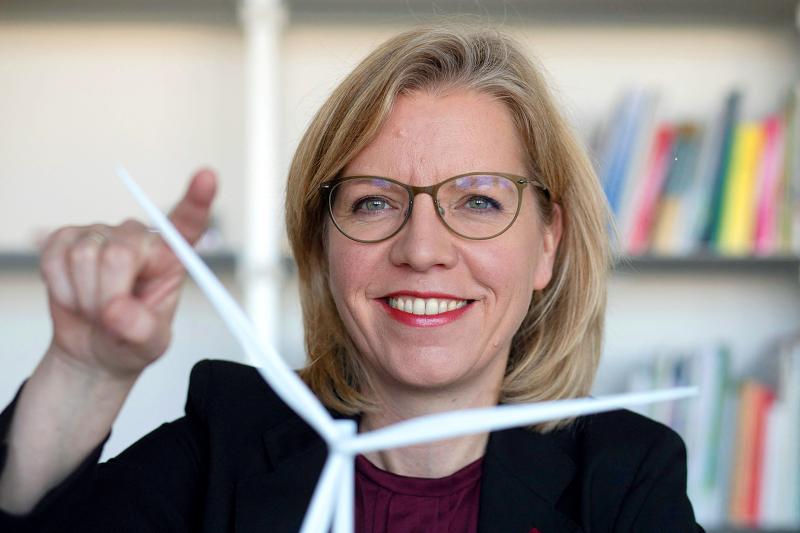As the EU moves to label energy from nuclear power and natural gas as “green” investments, Austria is gearing up to fight this, including with a legal complaint.
The European Commission is consulting with member states and European lawmakers until tomorrow on its plans.
A final text could be published by end of the month and would become EU law effective from next year if a majority of member states or the EU Parliament fail to oppose it.

Photo: AFP
“Neither of these two forms of energy is sustainable and therefore has no place in the taxonomy regulation,” Austrian Minister for Climate Action, Environment and Energy Leonore Gewessler told reporters in an interview this week at her office in Vienna.
“If the commission continues to work with this proposal and implements it, then it is clear that we will take legal action,” Gewessler said.
Austria had “very, very strong arguments” why energy from nuclear power and natural gas should not be labeled as green and as such she has “great confidence” that a complaint at the EU Court of Justice could succeed, Gewessler said.
“The question of waste disposal [from plants that generate nuclear energy] has not been solved for decades,” she said.
“It’s as if we give our children a backpack and say: ‘You will solve it one day,’” she said.
She also said that natural gas produces significant greenhouse emissions.
Austria is also lobbying other members of the EU, including Germany, to oppose the commission’s proposal.
So far, Luxemburg has indicated that it would support a legal complaint, Gewessler said.
“Whatever is labeled green, whatever is labeled sustainable must also actually contain green and sustainable investments,” she said, adding that sources of renewable energy are “cheaper, more readily available, and a safer and better alternative to nuclear energy.”

‘SHORTSIGHTED’: Using aid as leverage is punitive, would not be regarded well among Pacific Island nations and would further open the door for China, an academic said New Zealand has suspended millions of dollars in budget funding to the Cook Islands, it said yesterday, as the relationship between the two constitutionally linked countries continues to deteriorate amid the island group’s deepening ties with China. A spokesperson for New Zealand Minister of Foreign Affairs Winston Peters said in a statement that New Zealand early this month decided to suspend payment of NZ$18.2 million (US$11 million) in core sector support funding for this year and next year as it “relies on a high trust bilateral relationship.” New Zealand and Australia have become increasingly cautious about China’s growing presence in the Pacific

The team behind the long-awaited Vera Rubin Observatory in Chile yesterday published their first images, revealing breathtaking views of star-forming regions as well as distant galaxies. More than two decades in the making, the giant US-funded telescope sits perched at the summit of Cerro Pachon in central Chile, where dark skies and dry air provide ideal conditions for observing the cosmos. One of the debut images is a composite of 678 exposures taken over just seven hours, capturing the Trifid Nebula and the Lagoon Nebula — both several thousand light-years from Earth — glowing in vivid pinks against orange-red backdrops. The new image

ESPIONAGE: The British government’s decision on the proposed embassy hinges on the security of underground data cables, a former diplomat has said A US intervention over China’s proposed new embassy in London has thrown a potential resolution “up in the air,” campaigners have said, amid concerns over the site’s proximity to a sensitive hub of critical communication cables. The furor over a new “super-embassy” on the edge of London’s financial district was reignited last week when the White House said it was “deeply concerned” over potential Chinese access to “the sensitive communications of one of our closest allies.” The Dutch parliament has also raised concerns about Beijing’s ideal location of Royal Mint Court, on the edge of the City of London, which has so

Canada and the EU on Monday signed a defense and security pact as the transatlantic partners seek to better confront Russia, with worries over Washington’s reliability under US President Donald Trump. The deal was announced after a summit in Brussels between Canadian Prime Minister Mark Carney and European Commission President Ursula von der Leyen and European Council President Antonio Costa. “While NATO remains the cornerstone of our collective defense, this partnership will allow us to strengthen our preparedness ... to invest more and to invest smarter,” Costa told a news conference. “It opens new opportunities for companies on both sides of the